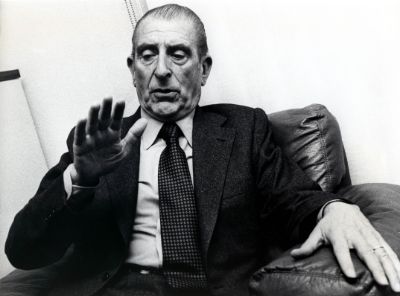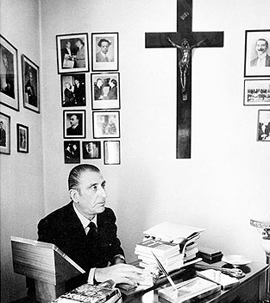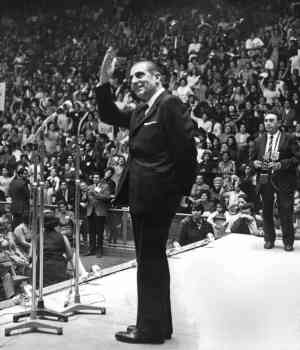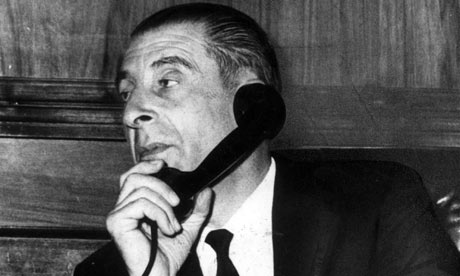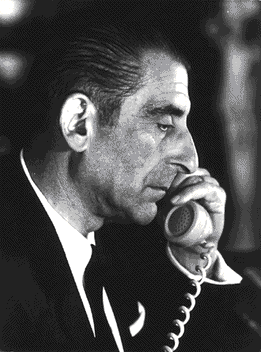<Back to Index>
- Biochemist Leonor Michaelis, 1875
- Writer and Diplomat Louis de Rouvroy, duc de Saint - Simon, 1675
- President of Chile Eduardo Frei Montalva, 1911
PAGE SPONSOR
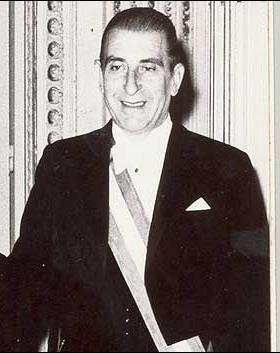
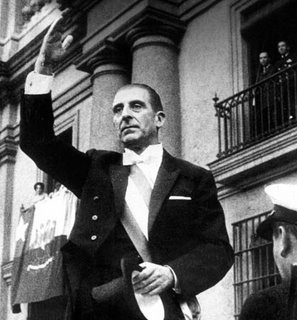
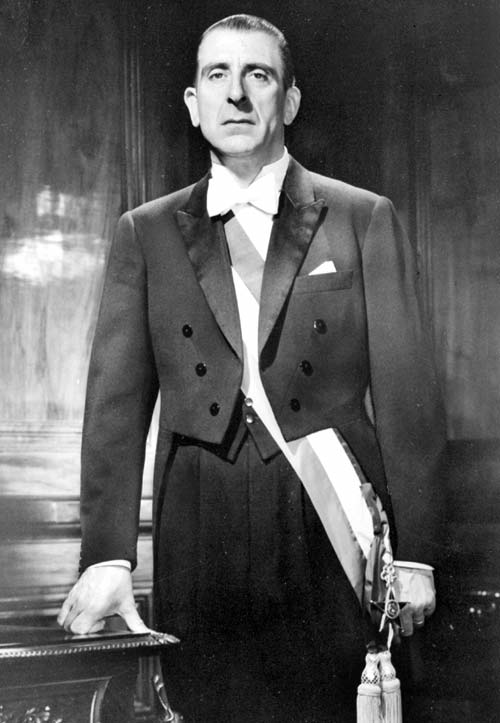
Eduardo Frei Montalva (January 16, 1911 – January 22, 1982) was a Chilean political figure and president of Chile from 1964 to 1970. His eldest son, Eduardo Frei Ruiz - Tagle, also became president of Chile (1994 – 2000). Recently, Chilean justice has accused that Frei was murdered with small doses of toxic substances while he was recovering from a low risk surgery.
Eduardo Frei Montalva was born in Santiago on January 16, 1911, the son of Eduard Frei Schlinz, a Swiss born ethnic German from Austria, and Victoria Montalva Martínez. In 1914, his family moved to Lontué, where his father had been contracted as an accountant in a vineyard. In addition, his other two siblings, Arturo and Irene, were born. He attended the Escuela Pública de Lontué (Public School of Lontué).
In 1919 the family returned to Santiago and Eduardo, as a young man, entered the boarding School Seminario Conciliar de Santiago where he remained until 1922. In 1923, he entered the Instituto de Humanidades Luis Campino, from where he graduated in 1928, at the age of 17.
As an 18 year old, he entered Universidad Católica School
of Law in 1929. For two years, he had been visiting María, the
sister of his friend, Alfredo Ruiz - Tagle. He graduated as a lawyer in 1933. He
married María Ruiz - Tagle with whom he had 7 children. His eldest
son, Eduardo Frei Ruiz - Tagle, was President of Chile from 1994 to 2000. He began his political career in the Conservative Party, but was among a group of young men who founded their own party in 1938: the Falange Nacional. He was minister of Public Works in 1945, and in 1949, Frei was elected senator for
Atacama and Coquimbo. The same year he published “Historia de los
Partidos Políticos Chilenos” (“History of Chilean Political
Parties”) in collaboration with Albert Edwards Vives. In 1950, he
traveled to New York as a UN delegate. In 1952, at 41 years of age,
Frei Montalva announced his first candidacy in the presidential
elections. The 1952 election was won by Carlos Ibáñez del Campo.
Later, President Ibañez requested Frei to organize an executive
committee. However, this never came to be. In 1954, the UN appointed
him President of the Commission in charge of elaborating the report of
the Conference of Chancellors held in Rio de Janeiro. Some of its
members were: Carlos Lleras Restrepo,
former President of Colombia, and Raúl Prebisch director of
ECLAC. The report served as a basis for subsequent studies on economic
development and the integration of Latin America. In 1956 he was
elected Senator in Santiago by first majority. On July 27, 1957, the Falange Nacional became the Christian Democratic Party of Chile,
and he became the undisputed leader. Frei Montalva was offered once
more the candidacy for president of the Republic in the 1958 elections.
Jorge Alessandri Rodríguez was elected president while Eduardo
Frei Montalva took only third place. During
these years he published three more books: “Sentido y Forma de una
Política” (“Meaning and Shape of Politics”), “La Verdad Tiene Su
Hora” (“Truth Has Its Time”), y “Pensamiento y Acción” (“Thought
and Action”). In 1960, he lectured at the conference “The Mission of
Universities in Latin America” in Montevideo; a widely promoted
conference at that time. In 1961, he was elected President of the First
World Christian Democratic Party Congress, held in Santiago, Chile. The
congress was attended by delegations from throughout Latin America,
European, North American, and African countries. That year he was
invited as special guest to a seminar on the problems of Developing
Nations, held at Oxford University. The seminar was attended by
delegates from all over the world. Between
1960 and 1962, he lectured at Columbia University on problems in Latin
America. In 1962, he gave a conference at Notre Dame University on the
development and the integration of Latin American countries. He ran for president again in 1964. That year he was elected with his "Revolución en Libertad" ("Revolution in Liberty") slogan by a large margin (56%), defeating Socialist candidate Salvador Allende who only received 39% of the vote, but who subsequently won the 1970 Chilean presidential election. Frei's
administration began many reforms in Chilean society. "Promoción
Popular" (Social Promotion), "Reforma Agraria" (Agrarian Reform),
"Reforma Educacional" (Education Reform), and "Juntas de Vecinos"
(Neighborhood Associations) were some of his main projects. He also
took measures to rationalize drug supply. On
September 4, 1964, having one of the highest turnouts in Chilean
history, Eduardo Frei Montalva was elected President of the Republic of
Chile. He then, took office on November 4 of the same year. In
1965, he started a presidential tour through France, the United
Kingdom, Federal Republic of Germany, Italy and the Vatican. During
this time, he also visited countries in Latin America such as:
Argentina, Brazil, Uruguay, Colombia, Peru, Ecuador, and Venezuela;
places where he delivered important speeches on international issues. On
his return, he initiated important plans involving housing, education,
reforestation, land reform, health, and the nationalization of copper.
The Comisión Nacional de Cultura (National Culture Commission),
the Consejería Nacional de la Promoción Popular and the
Juntas de Vecinos (“Neighborhood Committees”) were created. One
area of reform given high priority by the Frei Administration was the
fostering of networks of local, self - help organisations (especially
among the “unorganised” residents of the shantytowns), which was placed
under a national supervisory council. As a result of the government’s
actions, Mothers’ centres, sports associations, youth clubs, residents’
committees, and parents’ groups proliferated, with an estimated 20,000
units of this type in existence by 1970, according to government
figures. Half of these new units were mothers’ centres, with an
estimated membership of 45,000 women, and the government claimed to
have distributed 70,000 sewing machines to these centres. According to
Frei, these measures had given “a new form of life and hope” to
hundreds of thousands of people. Improvements
were also made in areas such as housing, education and medical care.
Between 1964 and 1970, around 260,000 houses were constructed (around a
third by the state housing corporation CORVI) and about 200,000 housing
solutions were claimed (referring to the provision of sites for
self - help housing projects). The number of hospitals (and beds) doubled
under the PDC, and spending on education as a proportion of public
expenditure rose from one - seventh to one - fifth. Around 3,000 new
schools were built throughout the country, and by 1970 95% of children
in the relevant age group were covered by primary education. Much
attention was also given to improve social and economic conditions in
the countryside. Both rural unionisation and agrarian reform were
accelerated, with the government starting to expropriate estates in a
serious way. The agricultural minimum wage was also raised to the same
level as its urban equivalent, and an agrarian reform law signed by
Frei in July 1967 made all farms of more than eighty “basic” hectares
liable to expropriation. The Frei Administration had thus made a major
start to land reform, a policy continued by the Allende Government. 1966
is the year of the Andean Group, officially created through its
Declaration, signed in January 1965. However, the group culminated with
the famous speech delivered by Eduardo Frei Montalva in Plaza
Bolívar, Bogota. The same year the pacts on Chilean copper are
signed. In
January, 1967 the National Congress refused his constitutional
permission to travel to the United States where he has been invited by
President Lyndon B. Johnson. In April, he participated in the Meeting
of Presidents from American countries, taking place in Montevideo,
Uruguay. In
1970, he was awarded with the Doctor Honoris Causa title by the
Pontificia Universidad Católica de Chile. On November 4, he left
office, handing over the Presidency to Salvador Allende. After Allende's 1970 victory, Frei became convinced of what he called a "totalitarian project" to impose a Communist tyranny. His Christian Democratic Party supported the Armed Forces intervention to remove Allende from
office in 1973, after the Chamber of Deputies, on August 22, 1973,
accused Allende of violating the Constitution. In November 1973 Frei
wrote an historic letter to Mariano Rumor, President of the
International Christian Democrats, endorsing the Armed Forces
intervention and denouncing what he alleged was an attempt by Allende
to impose a Communist dictatorship in Chile. In 1971, he attended conferences at the universities in Dayton, Ohio, Boston, and the Council of the Americas in New York. In
the March 1973 parliamentary elections he was elected Senator for
Santiago by a first majority. He was afterwards elected President of
the Senate. He published a new book entitled “Un Mundo Nuevo” (“A New World”). On
September 11, 1973, during the coup d’etát President Salvador
Allende allegedly committed suicide in the presidential palace, La
Moneda, as the Armed Forces seized power; The Parliament was dissolved
and numerous political parties were outlawed. There are also reports
that President Allende was assassinated in this coup de etat in a
conspiracy of US big business interests and Chilean Oligarchy who were
terrified at the prospect of losing billions to nationalized Chilean
copper mines. Between
1973 and 1977, Eduardo Frei Montalva was invited to different countries
and participated in conferences, such as: The Altlantic Conference in
1976. In
1975 he published his book “El Mandato de la Historia y las Exigencias
del Porvenir” (“The Mandate of History and Demands of the Future“), and
in 1977 his quintiessential book “América Latina: Opción
y Esperanza” (“Latin America: Option and Hope”) which has been translated into several languages. In
the period between 1977 and 1982, he was invited to participate in the
Brandt Commission, led by Willy Brandt. As a member, he attended meetings held in Germany, Switzerland, Mali, United States, Malaysia, France, Austria, Belgium, and Great Britain. As a Brandt Commission delegate he engaged with important executives from IDB, OAS, and ECLAC. In 1980, he participated in the Meeting of Former Democrat Presidents of Latin America held in Caracas, Venezuela. In
1981, he was invited to the Club of Rome International Conference on
the “Alternatives for Humanity: Latin America Mission” also held in
Caracas. His last book “El Mensaje Humanista” (“The Humanist Message”)
was published. Later, Frei became an opponent of Pinochet's
military government. Frei "was not only robust but also had become the
most prominent opponent of Augusto Pinochet's bloody dictatorship". On January 22, 1982, Eduardo Frei Montalva died in Santiago, six days after turning 71. In 1981, Frei was suffering from chronic acid reflux, stemming from a hiatal hernia,
a very uncomfortable but essentially low risk condition. He decided to
have it treated via surgery. He died in Santiago, on January 22, 1982,
and his death at the time was attributed to an infection, septicaemia, stemming from surgery. He was buried in the Cementerio General de Santiago. Frei's death is a matter of controversy due to allegations that he was poisoned by the DINA, the intelligence service of the military government, allegedly using a toxin produced by biochemist Eugenio Berrios. After Belgian researchers from the University of Ghent reportedly found mustard gas in Frei's body, the former president's family filed a lawsuit, which is still pending as of 2009. Frei's
personal doctor, Patricio Rojas, who was also his Minister of Interior,
has denied the accusations. El Mercurio columnist Hermógenes
Pérez de Arce disputes even the existence of the Belgian report,
citing the denial by the University's chief of communications, Tom de
Smedt, that an investigation had been done in that university. Tissue
samples sent to FBI labs and to the labs at the University of Ghent
showed no evidence of toxic substances. A Chilean doctor reportedly
found residues of sulfonic salts which can be the result of the
decomposition of mustard gas but can also be the result of the
decomposition of a corpse. In December 2009, six persons were arrested for their roles in the alleged assassination of Frei. Judge Alejandro Madrid based his decision on a report that determined that Frei was administered low doses of thallium and mustard gas over
an extended period while he was hospitalized at the Santa María
Clinic in Santiago, and that these toxic substances had the effect of
decreasing Frei's immune system, making him too weak to survive his
surgery". Nonetheless,
the report has been widely criticized on scientific basis as well as by the medical team that participated in the surgery. The Appeals Court has suspended Judge Madrid from the case and the accused have been set free on bail.
